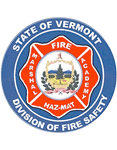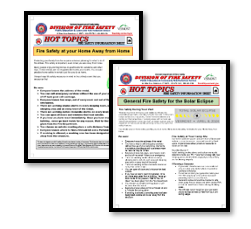
Fire and Life Safety During Your Visit for the Solar Eclipse
Whether you live in Vermont or are visiting to witness this generational spectacle, ensuring everyone can take in this year’s eclipse safely is our top priority. Some Vermont residents are renting out their properties or camping areas with no hohookupsVisitors should keep in mind that many of these locations are not regulated like hotels and motels and may not have the same fire safety features.
You should practice home safety just like you do at home. Here are some safety reminders for your Home Away from Home
Be sure:
-
Everyone knows the address of the rental.
-
You have a way to call emergency services.
-
Everyone knows two ways, out of every room and out of the rental if there is an emergency.
-
There are working smoke alarms in every sleeping room, outside each separate sleeping area, and on every level of the rental.
-
There are working carbon monoxide alarms on every level of the rental.
-
You can open all doors and windows that lead outside.
-
If you hear an alarm react immediately. Once you have evacuated from a building, never go back inside for any reason. Wait for the “All Clear” has been given from the Fire Department.
-
You choose an outside meeting place a safe distance from the rental.
-
Everyone knows where to find a first-aid kit and a Portable fire extinguisher.
-
If smoking is allowed, a smoking area has been designated outside and is well away from the structure.
Fire Safety at Your Camp Site
Due to the confined spaces and presence of flammable materials, in rustic areas or areas with no utility hook ups is crucial to take added proactive measures to minimize fire risks.
Be sure:
You have Alarms?
Install working smoke alarms and carbon monoxide detectors inside your RV. Place them strategically near sleeping areas and test them regularly to ensure they are functioning properly.
If Running a Generator
-
A generator should never run in an enclosed area or under any shelter where it cannot be ventilated efficiently.
-
Do not run or store your generator inside your tent. Not only do you risk carbon monoxide poisoning, but it is also a fire risk.
-
Generator exhaust should be directed to safe areas away from windows and other nearby RVs or tents to avoid fumes from entering the living areas.
-
Fire Officials recommend that your generator should be kept at least 20 feet from your unit during usage.
-
Additionally, because of the proximity to other campers, it’s recommended that units be equipped with an exhaust extender flow pipe that vents the harmful exhaust above the highest windows of RVs.
-
Never refuel when the generator is running and allow the generator to cool before refueling.
Fire Extinguishers
-
Equip your RV with fire extinguishers rated for RV use. Consider having multiple extinguishers strategically placed in accessible locations, such as near the kitchen and sleeping areas.
Escape Path
-
Keep a clear and unobstructed path to the exits in case of an emergency. Ensure that doors and windows open smoothly and are easily accessible.
Maintain Systems
-
Regularly inspect and maintain the propane system to detect any leaks or malfunctions.
-
Regularly inspect and clean your RV’s heating system, including vents, furnaces, and space heaters. Remove any debris or flammable materials that may accumulate.
If Small Campfires are Allowed
-
Clear a 10-foot area around the pit, removing anything that could catch on fire.
-
Never leave a campfire unattended; an adult should supervise the campfire at all times.
-
Keep a bucket of water and shovel nearby.
-
Never put anything but wood into the fire.
When it's time to put the fire out, dump lots of water on it, stir it with a shovel, then dump more water on it. Make sure it is COLD before leaving the campsite.
Sleeping in your Car
- Sleeping in a vehicle with the vehicle running can be dangerous. Cars are not airtight, and a leaky exhaust system could result in poisonous carbon monoxide gas entering the vehicle.
- Opening the window slightly to allow fresh air in
- Run the vehicle heater to warm it up and turn off the engine before you go to sleep.
- The use of a travel portable carbon monoxide alarm is recommended.
- Make sure you have a safe parking location.


